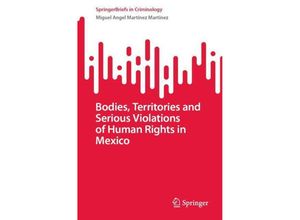This book seeks to contribute to the analysis of the serious violations of human rights in
Mexico during the processes of democratic transition and the War on Drugs by taking bodies and
territories as archives of the crimes committed by the Mexican State in the last decades. The
text presents an analysis of the disappearance of persons forced internal displacement and
gender violence as systematic expressions of State violence. These fields of research allow us
to point out tensions between social practices and the institutional fragility that
systematically denies human rights violations while at the same time ratifies and celebrates
them.The thematic knotting between bodies and territories is anchored in the processes of
shaping a memory that expresses State violence and presents the silenced resistances of
minority social groups that elude the traditional forms of registration control and collection
of data. From these coordinates body-territories are approached as scenarios where
intersectionally-knotted violences unfold. The theoretical approaches considered are mobilized
through a critical approach to capitalism colonialism and patriarchy in order to analyze
public policies and narratives related to the protection of bodies-territories as well as the
responses to the needs interests and preferences of different groups and individuals whose
lives are marked by the experience of serious human rights violations. Finally this approach
also considers the new ways in which crimes against humanity unfold in situations of democratic
transition as well as the forms of symbolic exchanges in the transmission of meaning and
community bonding. Bodies Territories and Serious Violations of Human Rights in Mexico will be
of interest to academic researchers and graduate students in different fields of knowledge
such as criminology sociology history anthropology philosophy psychology and the
interdisciplinary field of human rights studies.

